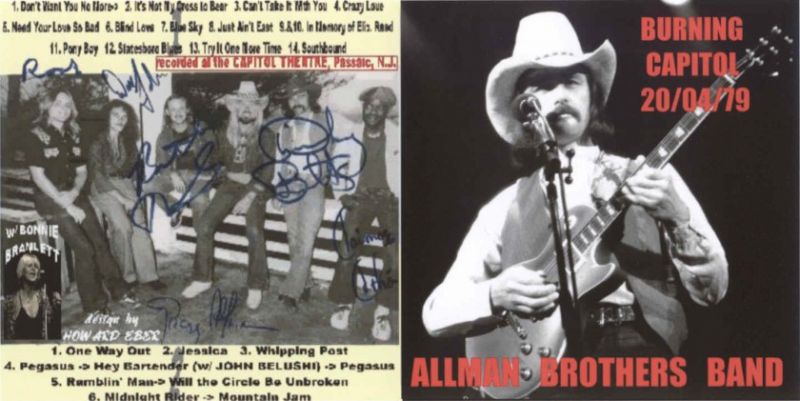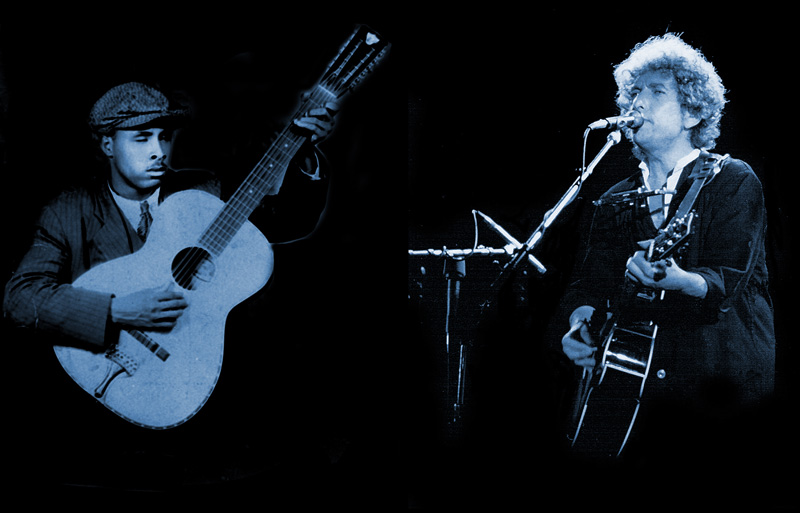Peter Green is regarded by some fans as the greatest white blues guitarist ever, Eric Clapton notwithstanding.
~Mark Allan (allmusic.com)
Need Your Love So Bad:
Continue reading October 29: Peter Green was born in 1946 Happy Birthday
Peter Green is regarded by some fans as the greatest white blues guitarist ever, Eric Clapton notwithstanding.
~Mark Allan (allmusic.com)
Need Your Love So Bad:
Continue reading October 29: Peter Green was born in 1946 Happy Birthday

This is good quality audio and video of the complete show and a strong performance by The Allman Brothers, which included Bonnie Bramlett. Following the drum solos in the middle of “Pegasus,” John Belushi joins the band onstage and sings “Hey Bartender.” This was broadcast live on WNEW so fans are very familiar with this show. The show was presented by John Scher. Earlier that month, the ABB began its first tour since disbanding in 1976. This tour was in support of the recently released “Enlightened Rogues” LP.
This Allman Brothers show has been bootlegged on several occasions.

Blind Willie McTell was voted the best 80s song in our little poll, deservedly so.
“Blind Willie McTell” is a song by Bob Dylan, titled after the blues singer Blind Willie McTell. It was recorded in 1983 but left off Dylan’s album Infidels and officially released in 1991 on the The Bootleg Series Volumes 1–3 (Rare & Unreleased) 1961–1991. The melody has a resemblance to “St. James Infirmary Blues”. For the song, Dylan, seated at the piano and accompanied by Mark Knopfler on the twelve-string acoustic guitar, sings a series of plaintive verses depicting allegorical scenes which reflect on the history of American music and slavery. Each verse ends with the same refrain: “Nobody can sing the blues like Blind Willie McTell”.
Following three albums with overt Christian themes, Infidels struck most major rock critics as dealing largely with secular concerns, and they hailed it as a comeback. The mysterious exclusion of “Blind Willie McTell” complicates the story. When bootleggers released the outtakes from Infidels, the song was recognized as a composition approaching the quality of such classics as “Tangled Up In Blue”, “Like a Rolling Stone” and “All Along the Watchtower”.
Bob Dylan – Blind Willie McTell (audio, Bootleg series 1-3):
This is the spookiest important record since Heartbreak Hotel, and is built upon the perfect interweaving of guitar, piano, voice and silence – an interweaving that has the space for the lovely clarity of single notes – a guitar string stroking the air here, a piano note pushing back the distance there. And if anything, the still-unreleased performance is even better, for its more original melody (less dependent upon the conventional St. James Infirmary structure) and its incandescent vocal, which soars to possess the heights of reverie and inspiration. No one can sing the blues like Blind Willie McTell, but no one can write or sing a blues like Blind Willie McTell like Bob Dylan.
– Michael Gray
Bob Dylan – Blind Willie McTell (audio, electric version):
“One of Bob Dylan’s absolute masterpieces, “Blind Willie McTell” is the jewel of The Bootleg Series and arguably one of the finest songs ever written. Recorded in 1983 for the album Infidels, it was deemed superfluous to requirements, and all that remains is one take of the song with a full band (yet to be officially released) and this haunting demo, with Dylan playing piano with accompaniment from Mark Knopfler.”
– Thomas Ward (allmusic)
The best!
Continue reading Bob Dylan’s Blind Willie McTell cover versions audio and video
“Rock ‘n’ roll doesn’t always pay the bills, and I’ve been interested in bars – obviously – for a long time,”
~Greg Dulli
Debonair (live @ Conan O’Brien):
| Born | May 11, 1965 (age 48) |
|---|---|
| Origin | Hamilton, Ohio, U.S. |
| Genres | Alternative rock, Indie rock |
| Years active | 1987–present |
| Associated acts | The Twilight Singers, The Afghan Whigs, The Gutter Twins |
Love Crimes (live):
| Gregory Dulli (born May 11, 1965) is an American rock singer and instrumentalist. Dulli was born and brought up in a working-class suburb of Hamilton, Ohio. Dulli’s father’s side of the family comes from Kalamata-Peloponnese, Greece and his mother comes from West Cork, Ireland. He first came to public attention in Cincinnati in the late 1980s with The Afghan Whigs, when Dulli joined D.C. transplant bassist John Curley and Louisville, Kentucky, guitarist Rick McCollum. The band was comic punk rock. One indie rock critic wrote that The Afghan Whigs were “the most cartoony band in all of hairdom”. Dulli’s half-hour-long on-stage cigarette breaks, complete with running commentary on sexual politics and attempts at matchmaking at first enraged, but later fascinated the clientele. Dulli’s budding career in the rock and roll production business was halted as The Afghan Whigs began playing more and better gigs, drawing bigger and bigger crowds. The band was soon brought to the attention of Sub Pop Records in Seattle. Sub Pop’s signing of The Afghan Whigs created quite a stir; they were the first non-Northwestern U.S. band to record for the label. The Whigs split in 2001. ~in.com |
Afghan Whigs:
| Evolving from a garage punk band in the vein of the Replacements, Dinosaur Jr., and Mudhoney to a literate, pretentious, soul-inflected post-punk quartet, the Afghan Whigs were one of the most critically acclaimed alternative bands of the early ’90s. Although the band never broke into the mainstream, they developed a dedicated cult following, primarily because of lead singer/songwriter Greg Dulli’s tortured, angst-ridden tales of broken relationships and self-loathing. The Afghan Whigs were one of the few alternative bands around in the late ’90s to acknowledge R&B, attempting to create a fusion of soul and post-punk. ~Stephen Thomas Erlewine (allmusic.com) |
You My Flower (live 1992-03-18, Khyber, Phila., PA):
Check out:
| Birth name | Peter Allen Greenbaum |
|---|---|
| Born | 29 October 1946 (age 66) Bethnal Green, London |
| Genres | Blues rock, blues, rock |
| Occupations | Musician, songwriter |
| Instruments | Guitar, vocals, harmonica, banjo,cello |
| Years active | 1966–present |
| Labels | Epic, Reprise, PVK, Creole |
| Associated acts | John Mayall & the Bluesbreakers, Fleetwood Mac,Peter Green Splinter Group,Gass, Peter B’s Looners, Otis Spann,Willie Dixon, B.B. King |
Peter Green (born Peter Allen Greenbaum, 29 October 1946) is a British blues rock guitarist and the founder of the band Fleetwood Mac. Inducted into the Rock and Roll Hall of Fame in 1998 for his work with the group, Green’s songs have been recorded by artists such as Santana, Aerosmith, Midge Ure, Tom Petty, and Judas Priest.
A major figure and bandleader in the “second great epoch” of the British blues movement, Green inspired B. B. King to say, “He has the sweetest tone I ever heard; he was the only one who gave me the cold sweats.” Eric Clapton and Jimmy Page have both lauded his guitar playing. Green’s playing was marked with idiomatic string bending and vibrato and economy of style. Though he played other guitars, he is best known for deriving a unique tone from his 1959 Gibson Les Paul.
Some of the best “white” blues ever – “The World Keep On Turning”:
From allmusic.com – Mark Allan:
Peter Green is regarded by some fans as the greatest white blues guitarist ever, Eric Clapton notwithstanding. Born Peter Greenbaum but calling himself Peter Green by age 15, he grew up in London’s working-class East End. Green’s early musical influences were Hank Marvin of the Shadows, Muddy Waters, B.B. King, Freddie King, and traditional Jewish music. He originally played bass before being invited in 1966 by keyboardist Peter Bardens to play lead in the Peter B’s, whose drummer was a lanky chap named Mick Fleetwood. The 19-year-old Green was with Bardens just three months before joining John Mayall’s Bluesbreakers, whose rapidly shifting personnel included bassist John McVie and drummer Aynsley Dunbar. A keen fan of Clapton, Green badgered Mayall to give him a chance when the Bluesbreakers guitarist split for an indefinite vacation in Greece. Green sounded great and, as Mayall recalls, was not amused when Clapton returned after a handful of gigs, and Green was out.
…read more @ allmusic.com
Fleetwood Mac (1968):
Fleetwood Mac’s debut LP was a highlight of the late-’60s British blues boom. Green’s always inspired playing, the capable (if erratic) songwriting, and the general panache of the band as a whole placed them leagues above the overcrowded field. Elmore James is a big influence on this set, particularly on the tunes fronted by Jeremy Spencer (“Shake Your Moneymaker,” “Got to Move”). Spencer’s bluster, however, was outshone by the budding singing and songwriting skills of Green. The guitarist balanced humor and vulnerability on cuts like “Looking for Somebody” and “Long Grey Mare,” and with “If I Loved Another Woman,” he offered a glimpse of the Latin-blues fusion that he would perfect with “Black Magic Woman.” The album was an unexpected smash in the U.K., reaching number four on the British charts.
~Richie Unterberger (allmuisc)